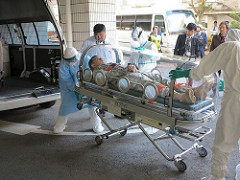The recent Ebola outbreak has reminded people of the fear associated with incurable diseases. A similar backlash occurred in the 1980s when the public became aware of HIV/AIDS. It isn’t unusual that people tend to recognize these diseases due to their high fatality rates. However, there are numerous other incurable diseases that are often overlooked for their relatively insignificant impact on lives, such as influenza and the common cold. Nevertheless, being able to cure diseases like Ebola will certainly improve lives in the long run. Fortunately, a protein has recently been identified as a possible target for treating many of these diseases.
Image Source: Maciej Frolow
Researchers have identified a protein called GRP78 as a possible cure for diseases like Ebola, influenza, and hepatitis. The GRP78 protein aids in the formation of proteins from amino acids and helps to maintain the shape of those proteins, which is important, since the shape of a protein determines its specific function. GRP78 is especially important in cancer cells or virus-infected cells because it produces more proteins than normal cells do. In a recent experiment, researchers made a drug combining OSU-03012 (AR-12) and Phosphodiesterase 5 Inhibitors (Viagra) to attack GRP78 and related proteins. By doing so, they were able to prevent the replication of viruses like Ebola and hepatitis in infected cells by reducing the expression of respective viral receptors. Similarly, in cancer cells, the drug combination reduced the expression of oncogene receptors. In bacteria, the GRP78 equivalent, known as DNA K, was attacked, inducing cell death in antibiotic-resistant forms of bacteria such as E. coli and N. gonorrhoeae.
The results of this study are exciting because the identification of GRP78 as a target for treating various viral and bacterial infections may enable us to combat diseases previously thought to be incurable.
Feature Image Source: MEDDAC-Japan conducts bilateral Ebola preparedness drill by Army Medicine










